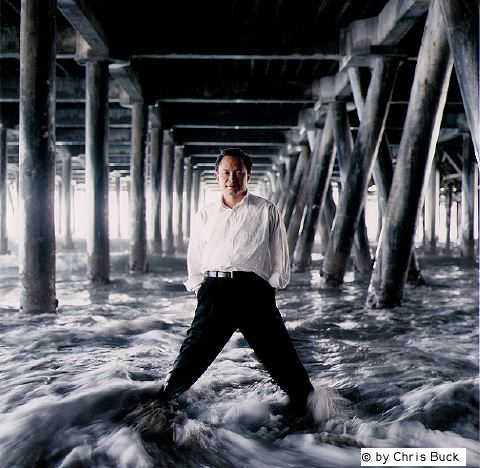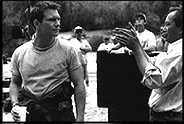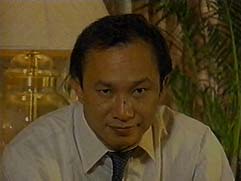

"ON JOHN WOO"
(NOTE: This essay first appeared in Asian Cult Cinema [number 20, May 1998, pp. 54-56] and is copyrighted by Vital Books, Inc.)
Both Tsui Hark [another important Hong Kong director] and myself felt that Hong Kong was seriously lacking in moral values. Young people were very lost, and trust towards the government was shaken. The year was 1985. I wanted to make an uplifting film to highlight the lost traditional values, including those of family, friendship, tolerance, etc. I decided to remake a sixities film (True Colors of A Hero, directed by Lung Kong) and that became A Better Tommorrow (released in 1986).
Tsui Hark, who also shared my desire of improving the quality of Hong Kong Cinema, supported me in the making of this film. While writing the movie, I submerged my own emotions into the character of Mark (played by Chow Yun-Fat). Those emotions became raw and real and the audience responded to him. So Mark became the hero of the film, even though he wasn't the central character.
I designed the gun battles and all the action sequences myself by combining elements from Westerns and Chinese Swordplay movies. They [the sequences] became something new and exciting for Hong Kong cinema. Those things contributed to the film's success.
While working in Hong Kong, I never used a storyboard; everything was kept in my mind. I had a very good assistant and the crew was accustomed to working with me, so we had a good understanding. They realized what I needed. Even though we were shooting a big action sequence, usually I would only have to tell them the general idea. It was all done on instinct.
I directed things the way I wanted, with no restictions from other people. I had no worries about the film because I had control of every shot. I felt like a painter. Everything would be shot by feeling, by the mood. And I tend to be very moody.

Actually, I had a lot of freedom in Hong Kong because, essentially, there were two main genres: action and comedy. Within those two genres, I had total freedom in creating my own material. Of course, I could never touch on political issues. Nor did I really care to. That wasn't the type of film I wanted to make.
By contrast, I didn't expect the problems I encountered when I entered the Hollywood system. There are too many people interefering with the creative side, and I didn't have script approval (in the beginning), so I couldn't do exactly what I wanted. Sometimes I would want to make some changes in the script, but in Hollywood they're really keen on making sure the project doesn't go over budget -- so changes simply don't get made.
There's also so much more concern over ratings.
I'm not a stranger to censorship. In Hong Kong, the censor board often made cuts in my films. For example, they made twenty edits in Hard-Boiled and I was not happy about that. But in Hong Kong I was never pressured by producers to tone down the violence in my films.
Before starting in Hollywood, I was advised to go easy on the violence, the bullets and the body count. Sometimes, I feel like I'd been restricted by these rules and all the pressures. But, on the other hand, I still very much appreciate the studio, the crew, the actors and the other filmmakers in Hollywood for their help and their support.

If there's a major difference between Hollywood and Hong Kong, it would have to be the crew. I think [Hollywood is] much more professional and dedicated to "making films." And the actors are so much more passionate about making an exceptional movie than in Hong Kong. Over there, we had plenty of good talent, but most of the crew just came to work for the money -- not for the ideas. Most of those people weren't educated in film. They just learned on the job. That's a big difference between here and there.
Bullet in the Head is my most personal film. I wanted to make it as a prequel to A Better Tommorrow, but Tsui Hark nixed the idea. After I made A Better Tommorrow 2, I brought the idea up again but Tsui still said no and I was very fustrated. After I finished The Killer, I was forced to leave Film Workshop. My current partner, Terence Chang, persuaded me to form my own production company (John Woo Film Production Ltd.). He talked to Golden Princess [a major Hong Kong studio] on my behalf and presold the film to some territories to give the studio confidence in the project. So, the film got made.

I spent four months shooting the movie and another four in post-production. For the Vietnam sequences, I shot in Thailand and it was a great experience. The Thai crew I used had just finished working on Good Morning Vietnam and The Killing Fields. They were extremely professional.
My characters often speak for me. Just as I identified with Mark in A Better Tommorrow, there's a lot of Ben (from Bullet in the Head) in me. In fact, the first part of the film was based on my experiences in the slums of Hong Kong during my adolescence.
Even though there is a lot of violence in my films, I am for world peace, justice and tolerance. I am not a political person. This comment is strictly from a humanist point of view.